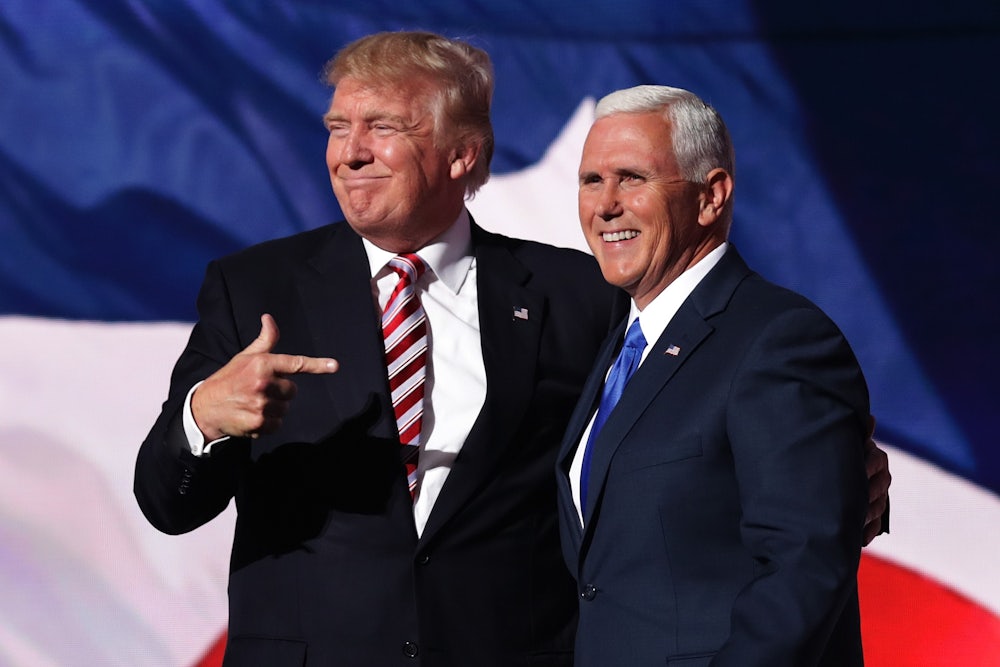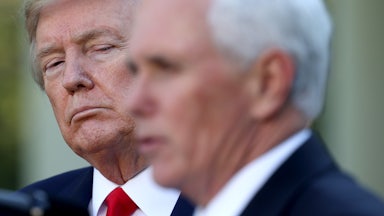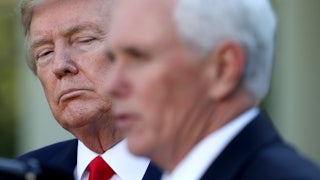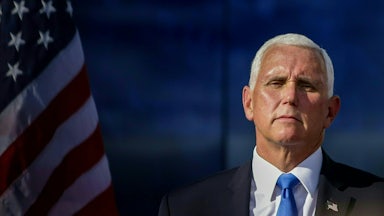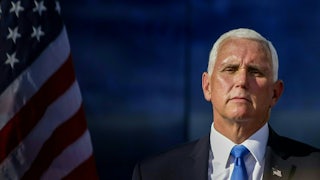Mike Pence may be the only person in America who thinks he might someday be president. For Trump diehards, he’s a traitor and a coward—someone who flinched at the precise moment he should have stolen the 2020 election. For Trump skeptics—however few there may be left in the Republican Party—and Democrats, he’s tarnished for his loyalty to the president. For everyone else, he’s a charisma-free, ultrareligious guy with the hair of a Lego figurine who is best remembered for the time a fly spent several seconds on his head. Pence is a national figure because he’s a loser: In the summer of 2016, no one thought Donald Trump could win and therefore no one wanted to be his vice president. Pence saw a low-risk opportunity to boost his profile. Four years later, Trump’s supporters nearly killed him.
Pence has nevertheless plowed on as if everything is hunky-dory, running an undeclared but barely disguised pre-presidential campaign. In early February, he received plaudits for a wimpy and milquetoast denunciation of his former boss’s attempts to overturn the election. It was the lowest of possible bars to clear: Pence offered “Donald Trump was wrong”—at least in his interpretation of the Constitution—in a speech that failed to denounce the president’s authoritarianism. Now comes the latest move: On Thursday, Pence released his first policy platform, a 17-page document titled “The Freedom Agenda.” It’s release generated further coverage highlighting his rift with Trump—Politico, for instance, headlined its piece on the policy platform, “Pence rolls out policy platform, staking out new ground separate from Trump.”
Sure: There is a rift between Donald Trump and his former vice president. But it has little to do with policy—it’s about Pence’s refusal to send the 2020 election back to several state legislatures in accordance with Trump’s demands. That failure culminated in vengeful rioters storming the United States Capitol. Pence’s policy agenda, on the other hand, hardly stakes out new ground at all—certainly not to the extent that illuminates some meaningful rift. Rather, Pence’s manifesto is the clearest indication yet that Trump’s mixture of “populism” on immigration and trade, coupled with his support of standard Republican ideas on issues such deregulation, cutting taxes for corporations and the wealthy, and culture-war issues from abortion to LGBTQ discrimination, is here to stay.
Where did Politico come up with the notion that Pence was pushing some different kind of politics from that which the Trump administration promulgated? It would seem that Pence’s somewhat catty swipe at Trump was mistaken for something substantive:
Pence is releasing a 19-page policy platform on Thursday aimed at casting himself as a figure of the future and moving the country “forward to ensure that the best days for the greatest nation on earth are yet to come.” It’s the kind of statement most prospective presidents would make, but in this case it’s also an implicit swipe at Trump, who is focused on relitigating the 2020 election as he weighs a comeback bid.
Pence does not include much in his policy platform about reversing the 2020 election. There is nothing about watermarked ballots in Arizona or, for that matter, a massive Democratic Party conspiracy to steal the election from Donald Trump. Is this such a puzzlement? Pence’s position on these matters is pretty consistent with someone who is running for president in 2024. Why would he expend effort trying to convince the world that Trump won an election that he had clearly lost as a part of his own presidential campaign?
When you actually examine Pence’s policy platform, what you see is … a lot of stuff that Donald Trump and Mike Pence did while running the country. Sure, it’s heavy on Pence’s hyperreligious obsessions: Its first list of items is focused on ending federal funding for abortions domestically and abroad, repealing the Johnson amendment (which prevents churches from endorsing candidates), and supporting “religious freedom.” These were never big Trump priorities, but they were nevertheless issues that he and his administration actively and aggressively pursued, to the roaring approval of conservative evangelicals, who didn’t fault Trump for his inability to match Pence’s displays of piety.
But the former vice president’s action plan gets Trumpier still. Pence notes, for instance, that as president he will prioritize finishing the wall on the southern border and “immediately deporting all” undocumented “criminals and gang members.” Sanctuary cities would be “banned.” There would be severe limitations on the granting of H1B visas, and immigrants would be required to prove that they were “financially stable” before entering the country. There are several items aimed at one of Trump’s signature campaign issues in both 2016 and 2020—addressing the rise in violent crime. There are several more addressing “critical race theory,” which are aimed at “promoting patriotic education.” Far from putting meaningful distance between Trump and himself, this verges on plagiarism.
While Pence’s economic agenda is largely a familiar flurry of tired bromides about the free market—largely built around “simplifying” the tax code and cutting regulations for corporations, while also attacking unions and welfare programs that actually help the working class—it also contains items about seeking “reciprocal” trade deals. This is arguably the biggest nod to the continued influence of Trump’s anti-free-trade approach in Republican politics. The anti-tech policies Trump championed, which focused on stopping the “censorship” of political conservatives, also make an appearance in Pence’s pamphlet.
On foreign policy, Pence continues to tread within Trump’s anti-China footprints, stressing that the country is an economic and security threat. The only recognizable difference here is that Pence doesn’t follow Trump into the wilderness of Vladimir Putin–worship or admiration for his regime. But this separation from Trump actually makes him less unique as a Republican: The GOP’s position, by and large, is that Biden is too soft on Russia. (Interestingly, Pence seems to back the Biden administration’s approach in one respect: He stresses the need to engage with allies to protect Europe from Putin’s aggression.)
All in all, there is scant evidence in this policy brief to support the idea that Pence has meaningfully different ideas from Donald Trump, other than the fact that he’s somewhat squishier on the issue of whether he should be murdered by rioters during an assault on the U.S. Capitol. Other than that detail, Pence, like the rest of the Republican Party, remains in thrall to Trump. The differences between the two have very, very little to do with policy and everything to do with Pence’s lawful certification of the 2020 election. Besides, what’s so special about breaking from Trump, anyway? The hot new thing in Republican politics isn’t pushing Trumpism away, it’s taking those impulses to staggering new heights of extremism. Pence will find this out for himself in due time.
